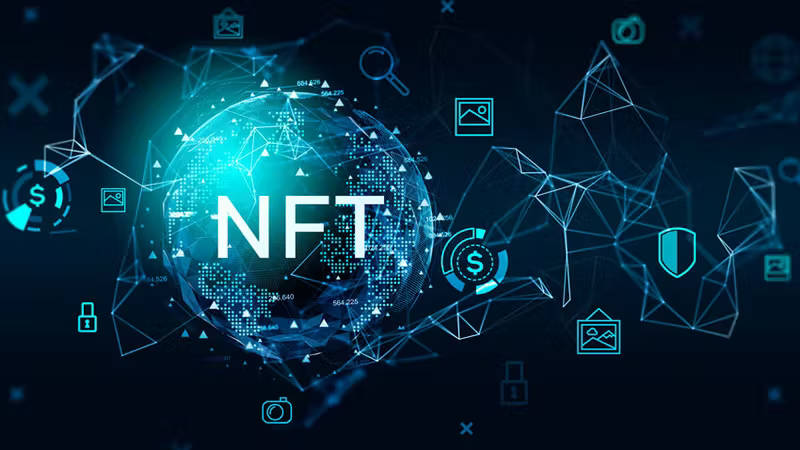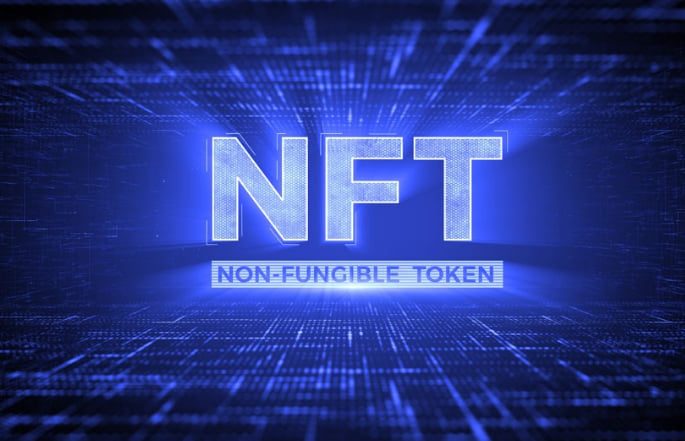As NFTs continue to take the world by storm, many people are still trying to wrap their heads around what they are and why they matter. As someone just entering the world of NFTs, I know how confusing it can be at first. That’s why I’ve created this beginner’s guide to walk you through the NFT basics so you can decide if joining this phenomenon is right for you.

What Are NFTs?
NFT stands for non-fungible token. I know, that doesn’t clear much up for crypto newbies.
NFTs are traded via the blockchain and each one contains a digital record of ownership that allows users to track the history of ownership for that particular piece, in the same way that a Baroque-era painting would come with a providence that details every past owner. Both items help prove the authenticity of the item, as only the real thing has any significant value.
Many music fans’ first introduction to the concept of NFTs came in March 2021 when the band Kings of Leon issued their new album in the form of an NFT. Called “When You See Yourself,” a limited number of copies of the album were released and came with other bonuses like digital artwork for fans to enjoy. Many other bands have followed suit, releasing both individual singles and entire albums in the NFT format, allowing their fans the opportunity to own something unique and take place in what is widely considered to be the future of the industry.
In simple terms, NFTs are unique digital assets stored on a blockchain. This gives them a verifiable record of ownership that can’t be altered.
NFTs can really be anything digital like:
- Artwork
- Music
- Videos
- Collectibles
- Virtual avatars and items
- Tweets
- Even real estate
What makes NFTs unique is that each one represents something different and has distinctive attributes that no other NFT shares. They aren’t interchangeable like cryptocurrencies, which is why they’re called non-fungible.
For example, 1 Bitcoin is always equal to 1 Bitcoin. But 1 NFT representing a custom illustration will always be distinct from another NFT of a song clip.
Why Do NFTs Have Value?

As you’re learning about NFTs, one of the most confusing parts is understanding why they have any value.
Unlike physical money, crypto, or assets, NFTs don’t have inherent value. You can’t use them for anything tangible.
Their value comes from these key factors:
Scarcity – Most NFTs are part of a limited set with a fixed supply. This creates scarcity that increases an NFT’s perceived value.
Demand – If an NFT depicts art from a popular creator or represents something with cultural significance, demand can greatly increase its worth.
Utility – Some NFTs offer utility by unlocking special perks like access to exclusive events, airdrops, or VIP services. This utility increases their value.
Social Status – For some people, owning certain NFTs can signify being part of an online community, supporting an artist, or gaining clout. This drives up demand.
So while an NFT itself isn’t physically useful, its cultural and social significance give it worth – kind of like how an autographed baseball card gets value.
How Do You Get an NFT?
Unlike cryptos, you can’t mine or earn NFTs. They have to be:
- Minted – This means using NFT software to create a new NFT from scratch. Not everyone can mint NFTs without help though.
- Bought – You can buy NFTs through marketplaces like OpenSea using cryptocurrency. Most existing NFTs must be purchased from previous owners.
- Airdropped – Some NFT creators do free airdrops where they send free NFTs to community members. Keep an eye out for giveaway announcements!
- Earned – In play-to-earn games like Axie Infinity, you can earn NFTs by playing. You can then sell or trade these rare items.
Once you acquire an NFT, it gets added to your crypto wallet. You’ll want to use a wallet designed for NFTs like MetaMask. This allows you to securely store, access, and manage your digital assets.
Where to Buy & Sell NFTs
Here are some of the top NFT marketplaces where you can browse, buy, and sell NFTs:
- OpenSea – The largest general NFT marketplace with diverse collections. Easy for beginners.
- Rarible – A community-owned space featuring many creator-made NFT drops.
- Foundation – Focused on independently created digital artworks.
- SuperRare – High-end marketplace for premium single edition digital art.
- AtomHub – Gaming-centric NFT marketplace for assets like avatars and loot boxes.
- NBA Top Shot – Official marketplace to buy and sell licensed NBA video highlight NFTs.
- Decentraland – A virtual world where you can buy NFT land parcels and wearables.
When buying NFTs, you’ll need to fund your wallet with crypto like ETH which is commonly used. Be sure to factor in additional gas fees for transactions on top of NFT prices.
How to Store & Protect NFTs
Since NFTs live on the blockchain, you need an NFT-compatible crypto wallet to store and access them securely.
Some top options include:
- MetaMask – Browser extension wallet that easily integrates with NFT marketplaces.
- Coinbase Wallet – Popular mobile app wallet with built-in dapp browser.
- Bitski – Wallet designed specifically for NFT beginners. Very user friendly.
- Argent – Advanced wallet option with added security features.
- Ledger – Hardware wallet providing offline storage for maximum security.
When choosing a wallet, opt for non-custodial options where you control the private keys. Avoid exchange wallets that actually own your assets.
Be sure to protect your wallet with proper precautions:
- Strong unique password
- 2-factor authentication
- Backup recovery phrase
- Avoid phishing links
This secures your NFT assets in case of any wallet mishaps.
Is Investing in NFTs Worth It?
With NFT values fluctuating wildly, you may be wondering if trying to invest in them is smart or just hype.
Here are the main pros and cons of investing in NFTs:
Pros
- Huge potential returns if values rise
- Get early access to promising projects
- Support artists and causes you believe in
- Be part of defining new ownership models
- Diversify your crypto portfolio
Cons
- Very speculative with high risks
- Massive volatility and uncertainty
- Many won’t retain value long-term
- High fees to buy, sell and transfer
- Requires tech savviness to navigate
My advice is to approach NFT investing cautiously. Only put in what you’re willing to lose, and focus on collecting art or projects you actually like.
The space is still evolving quickly. But if used properly, NFTs present exciting new opportunities!
Final Thoughts
As you can see, NFTs open up a whole new world of digital ownership, creativity, and community.
But I know it’s a lot for crypto newbies to digest instantly.
The key is to start slowly, learn the basics, and focus on exploring projects you find genuinely interesting.
Don’t get caught up in hype or pressure to jump in quickly. Take your time finding projects that resonate with you.
Learning and experimenting little by little is the best approach – gaining first-hand experience is invaluable.
Bookmark helpful resources, join some Discord communities, follow creators you like.
Soon the crypto jargon will start making sense and you’ll be ready to mint, buy or create your own NFTs confidently!
Just remember to always invest responsibly. Never spend more than you can afford to lose.
Hopefully this beginner’s guide gave you a friendly NFT introduction. But feel free to reach out with any other questions!
Happy exploring!
Frequently Asked Questions
What makes an NFT valuable?
An NFT’s value comes from its scarcity, demand, utility, and cultural significance. If it’s rare, desired, useful, and meaningful, it will be worth more.
Do you need crypto to get NFTs?
Yes, you’ll need cryptocurrency like ETH to purchase NFTs from marketplaces and to cover gas transaction fees.
Can you lose an NFT?
If you lose access to your wallet containing your NFTs, they could be lost forever. Always protect your wallet’s private key and recovery phrase.
Is every NFT unique?
Yes, every NFT is completely unique and not interchangeable with other NFTs, unlike fungible cryptocurrencies.
How do you make money from NFTs?
You can earn from NFTs by selling them for a profit if their value rises, unlocking utility benefits, earning royalties, or flipping them quickly.
What’s the most expensive NFT sold?
The record for most expensive NFT sold goes to Beeple’s $69 million dollar piece “Everydays: The First 5000 Days” auctioned by Christie’s.
Where do you store NFTs?
NFTs are stored securely in specialized crypto wallets like Metamask that allow you to access decentralized apps to view and manage your digital assets.
Can you sell an NFT after buying it?
Yes, most NFTs can be resold on secondary markets. Blockchain verifies you as the owner, allowing you to sell it to someone else.
Disclosure: The articles, guides and reviews on BlowSEO covering topics like SEO, digital marketing, technology, business, finance, streaming sites, travel and more are created by experienced professionals, marketers, developers and finance experts. Our goal is to provide helpful, in-depth, and well-researched content to our readers. You can learn more about our writers and the process we follow to create quality content by visiting our About Us and Content Creation Methodology pages.

